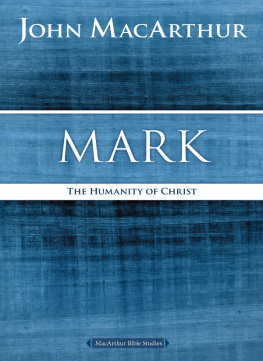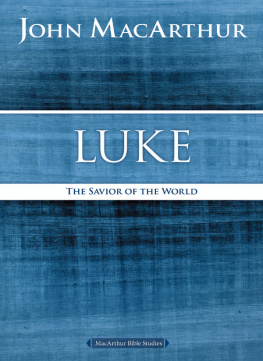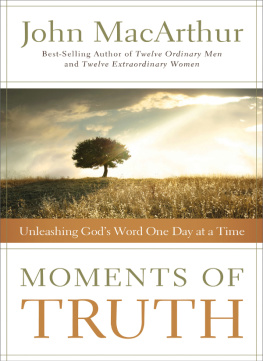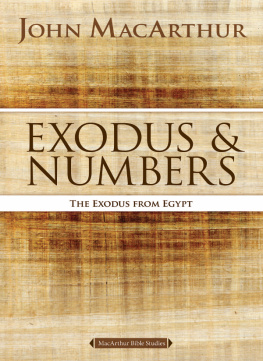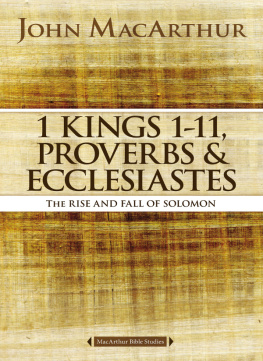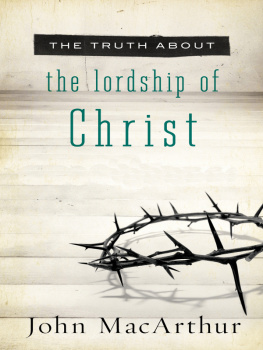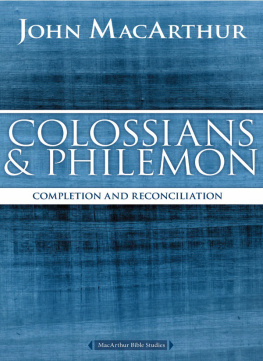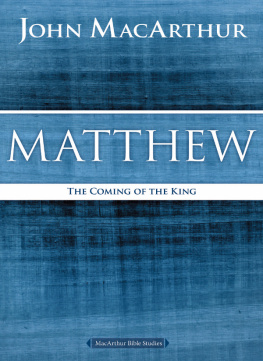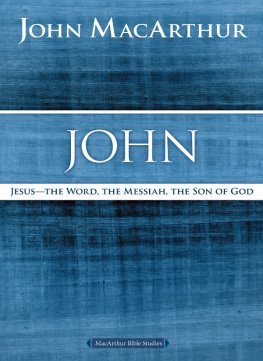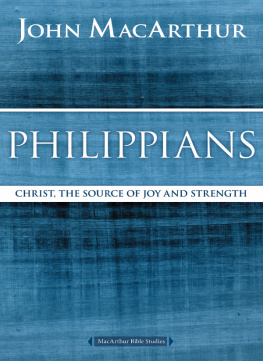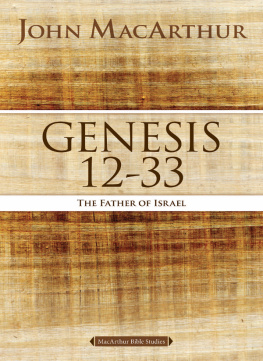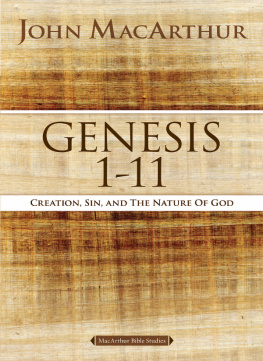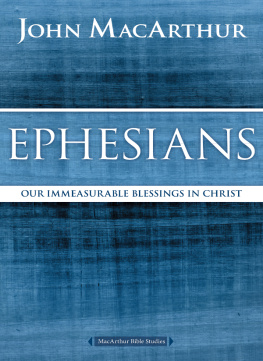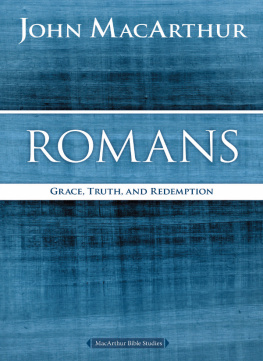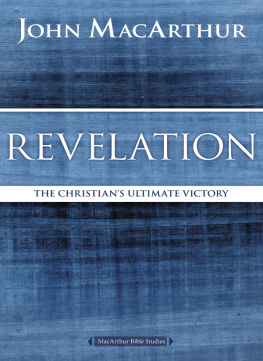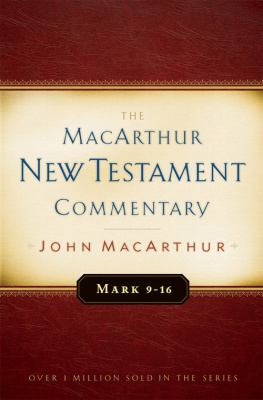MARK
MACARTHUR BIBLE STUDIES
2007, John F. MacArthur, Jr.
All rights reserved. No portion of this book may be reproduced, stored in a retrieval system, or transmitted in any form or by any meanselectronic, mechanical, photocopy, recording, or any otherexcept for brief quotations in printed reviews, without the prior permission of the publisher.
Published in Nashville, Tennessee, by Nelson Books, an imprint of Thomas Nelson. Nelson Books and Thomas Nelson are registered trademarks of HarperCollins Christian Publishing, Inc.
Nelson Books titles may be purchased in bulk for education, business, fundraising, or sales promotional use. For information, please email SpecialMarkets@ThomasNelson.com
Published in association with the literary agency of Wolgemuth & Associates, Inc.
Produced with the assistance of the Livingstone Corporation. Project staff include Jake Barton, Betsy Todt Schmitt, and Andy Culbertson.
Project editors: Mary Horner Collins, Amber Rae, and Len Woods
Scripture quotations marked NKJV are taken from the The New King James Version. 1982 by Thomas Nelson, Inc. Used by permission. All rights reserved.
Unleashing Gods Truth, One Verse at a Time is a trademark of Grace to You. All rights reserved:
Keys to the Text material taken from the following sources:
The Glory of Heaven: The Truth about Heaven, Angels, and Eternal Life. 1996 by John F. MacArthur. Published by Crossway Books, Wheaton, Illinois. Used by permission.
The MacArthur Study Bible (electronic ed.), John MacArthur, General Editor. 1997 by Word Publishing. All rights reserved. Used by permission.
Matthew, MacArthur New Testament Commentary Series. 1989 by John MacArthur. Published by Moody Press, Chicago. Used by permission.
Nelsons New Illustrated Bible Dictionary, Rev. ed. R. F. Youngblood, F. F. Bruce, R. K. Harrison, editors. 1995 by Thomas Nelson Publishers. Used by permission.
Twelve Ordinary Men: How the Master Shaped His Disciples for Greatness, and What He Wants to Do with You. 2002 by John MacArthur. Published by W Group. Used by permission.
Cover Art by Holly Sharp Design
Interior Design and Composition by Joel Bartlett, Livingstone Corporation
ISBN: 978-0-7180-3502-0
ISBN: 978-0-7180-3521-1 (eBook)
15 16 17 18 19 RRD 6 5 4 3 2 1
CONTENTS
Mark, for whom this Gospel is named, was a close companion of the apostle Peter and a recurring character in the book of Acts, where he is known as John whose surname was Mark (Acts 12:12, 25; 15:37, 39). It was to John Marks mothers home in Jerusalem that Peter went when released from prison (Acts 12:12).
John Mark was a cousin of Barnabas (Col. 4:10), who accompanied Paul and Barnabas on Pauls first missionary journey (Acts 12:2513:5). But he left them at Perga and returned to Jerusalem (Acts 13:13). When Barnabas wanted Paul to take John Mark on the second missionary journey, Paul refused. The resulting friction between Paul and Barnabas led to their separation (Acts 15:3840).
John Marks earlier vacillation, however, evidently gave way to strength and maturity, and in time he proved himself even to the apostle Paul. When Paul wrote the Colossians, he instructed them that if John Mark were to come, they were to welcome him (Col. 4:10). Paul even listed Mark as a fellow worker (Philem. 24). Later, Paul told Timothy, Get Mark and bring him with you, for he is useful to me for ministry (2 Tim. 4:11).
John Marks restoration to useful ministry may have been, in part, due to the ministry of Peter. Peters close relationship with Mark is evident from his description of him as Mark my son (1 Pet. 5:13). Peter, of course, was no stranger to failure himself, and his influence on the younger man was, no doubt, instrumental in helping him out of the instability of his youth and into the strength and maturity he would need for the work to which God had called him.
AUTHOR AND DATE
Unlike the Epistles, the Gospels do not name their authors in their texts. The early church fathers, however, unanimously affirm that Mark wrote this second Gospel. Papias, bishop of Hieropolis, writing about AD 140, noted: And the presbyter [the apostle John] said this: Mark having become the interpreter of Peter, wrote down accurately whatsoever he remembered. It was not, however, in exact order that he related the sayings or deeds of Christ. For he neither heard the Lord nor accompanied Him. But afterwards, as I said, he accompanied Peter, who accommodated his instructions to the necessities [of his hearers], but with no intention of giving a regular narrative of the Lords sayings. Wherefore Mark made no mistake in thus writing some things as he remembered them. For one thing he took special care not to omit anything he had heard and not to put anything fictitious into the statements. [From the Exposition of the Oracles of the Lord (6)]
Justin Martyr, writing about AD 150, referred to the Gospel of Mark as the memoirs of Peter, and suggested that Mark wrote his Gospel in Italy. This agrees with the uniform voice of early tradition, which regarded this Gospel as having been written in Rome for the benefit of Roman Christians. Writing about AD 185, Irenaeus called Mark the disciple and interpreter of Peter, and he noted that the second Gospel consists of what Peter preached about Christ. The testimony of the church fathers differs as to whether this Gospel was written before or after Peters death (ca. AD 6768).
Evangelical scholars have suggested dates for the writing of Marks Gospel ranging from AD 50 to 70. A date before the destruction of Jerusalem and the Temple in AD 70 is required by Jesus comment recorded in 13:2, referring to the Temple: Do you see these great buildings? Not one stone shall be left upon another, that shall not be thrown down.
Lukes Gospel was clearly written before Acts (Acts 1:13). The date of the writing of Acts can probably be fixed around AD 63 because that is shortly after the narrative ends. It is likely, therefore, though not certain, that Mark was written at an early date, sometime in the 50s.
BACKGROUND AND SETTING
While Matthew was written to a Jewish audience, Mark seems to have targeted Roman believers, particularly Gentiles. When employing Aramaic terms, Mark translated them for his readers (3:17; 5:41; 7:11, 34; 10:46; 14:36; 15:22, 34). On the other hand, in some places he used Latin expressions instead of their Greek equivalents (5:9; 12:15, 42; 15:16, 39). He also reckoned time according to the Roman system (6:48; 13:35) and carefully explained Jewish customs (7:34; 14:12; 15:42). Mark omitted Jewish elements, such as the genealogies found in Matthew and Luke. This Gospel also makes fewer references to the Old Testament and includes less material that would be of particular interest to Jewish readers, such as that which is critical of the Pharisees and Sadducees (Sadducees are mentioned only once, in 12:18). When mentioning Simon the Cyrene (15:21), Mark identifies him as the father of Rufus, a prominent member of the church at Rome (Rom. 16:13). All of this supports the traditional view that Mark was written for a Gentile audience initially at Rome.
HISTORICAL AND THEOLOGICAL THEMES
Mark presents Jesus as the suffering Servant of the Lord (10:45). His focus is on the deeds of Jesus more than His teaching, particularly emphasizing service and sacrifice. Mark omits the lengthy discourses found in the other Gospels, often relating only brief excerpts to give the gist of Jesus teaching. Mark also omits any account of Jesus ancestry and birth, beginning where Jesus public ministry began with His baptism by John in the wilderness.
Mark demonstrates the humanity of Christ more clearly than any of the other evangelists, emphasizing Christs human emotions (1:41; 3:5; 6:34; 8:12; 9:36), His human limitations (4:38; 11:12; 13:32), and other small details that highlight the human side of the Son of God (for example, 7:3334; 8:12; 9:36; 10:1316).
Next page
